

Financial Football. Lesson modules coming soon.
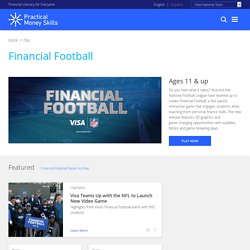
Do you have what it takes? Visa and the National Football League have teamed up to create Financial Football, a fast-paced, interactive game that engages students while teaching them personal finance skills. The new release features 3D graphics and game-changing opportunities with audibles, blitzes and game-breaking plays. Teachers are able to assign the game to students and track their completion by having students automatically email their results from the game. Play. Effective date: January 1, 2020 This notice explains Visa’s approach to cookies and other online data collection technologies.
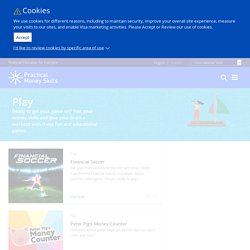
When you visit our websites, use our mobile apps, engage with our online ads or emails, we collect information, using technologies such as cookies, pixel tags (also called web beacons), browser analysis tools and server logs. Each of these technologies is explained below. 1. Life Values Examined with Financial Decisions. Terms of Use Welcome to Smart About Money website (the "Site").
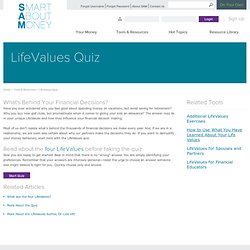
The Site is operated by the National Endowment for Financial Education®, a Colorado nonprofit corporation ("NEFE", "We" or "Us"). Please carefully read these Terms of Use. By using the Site, you acknowledge and agree that you have read and agree to be bound by these Terms of Use (the "Agreement"). This Agreement is made between NEFE and You or, in the case that you represent and are using the Site on behalf of a company or other entity, that company or other entity ("You"). 1. 2. True Cost to Own® (TCO®) Calculator on Edmunds.com. Home. Economic lesson plans, Personal Finance lesson plans and resources for educators, students and afterschool providers. A Mobile App Lesson on Financial Capability. Image credit: iStockphoto The goal of this lesson is teaching students how to use their mobile phones for financial management and financial decision-making.
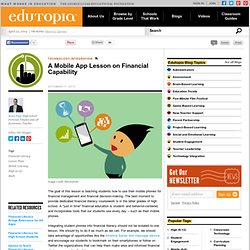
The best moment to provide dedicated financial literacy coursework is in the latter grades of high school. A "just in time" financial education is student- and behavior-centered, and incorporates tools that our students use every day -- such as their mobile phones. Integrating student phones into financial literacy should not be isolated to one lesson.
Hands on Banking 4.0 for Kids. Common Online Scams. Investing Online. Investment opportunities that claim to be low risk and high reward almost always are frauds.
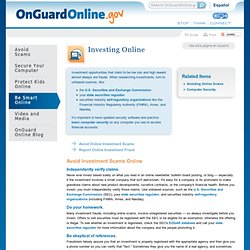
When researching investments, turn to unbiased sources, like: It’s important to have updated security software and practice basic computer security on any computer you use to access financial accounts. Avoid Investment Scams Online Independently verify claims. Never ever invest based solely on what you read in an online newsletter, bulletin board posting, or blog — especially if the investment involves a small company that isn't well-known. Shopping Online. Follow these tips for hassle-free online shopping: get the details, pay by credit card, keep records, and protect your personal and financial information.
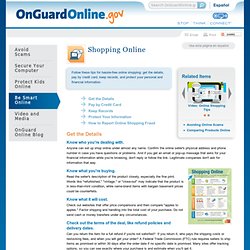
Get the Details Know who you're dealing with. Comparing Products Online. Shopping online?
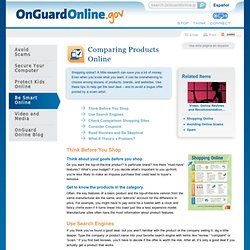
A little research can save you a lot of money. Even when you know what you want, it can be overwhelming to choose among dozens of products, brands, and websites. Use these tips to help get the best deal – and to avoid a bogus offer posted by a scam artist. Avoid Scams. LifeDojo. Paying for College. Trading Around the World. International trade touches us all.

We drink soda from cans made of aluminum mined in Australia, wear shoes made in Europe, eat fruit from South America, build machinery from steel milled in Asia, wear clothes made from African cotton, and live in homes built from North American wood. We take it for granted, yet before we can enjoy these products and materials, traders must negotiate prices and deliver the goods through a network of relationships that literally spans the globe. Play this game to experience the challenges and excitement of international trade. See if you can get the best price for the goods you sell and the biggest bargains for the goods you buy. Watch how the global economy is doing: the prices you'll be able to get and the deals you can make depend on how healthy the global economy is. Paying for College - Consumer Financial Protection Bureau. Understanding Taxes.
Where did my tax dollars go? WhatWePayFor.com. Visual Economics at CreditLoan.com. How Wealthy Countries TAX Their Citizens - Share this infographic on your website, simply copy and paste the source code in the box below to your website.
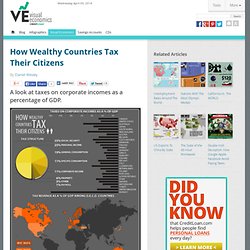
The tax structure is made up of 25 percent social security, 25 percent personal income, 19 percent general consumption, 11 percent specific consumption, 11 percent corporate income, 6 percent property, 3 percent other and 1 percent payroll. Taxes on Corporate Incomes as a Percentage of GDP The tax income from corporations represents almost 4 percent of the GDP of Canada. The tax income from corporations represents more than 3 percent of the GDP of the United States. In Australia, the tax income from corporations represents almost 7 percent of Australias GDP.
In Austria, the tax income from corporations represents more than 2 percent of Austrias GDP. The tax income from corporations represents about 3 percent of the GDP of France. The tax income from corporations represents almost 4 percent of the GDP of Ireland. Explain it to me: The 'Buffett Rule' Your 2011 Federal Taxpayer Receipt.